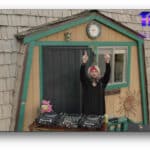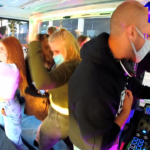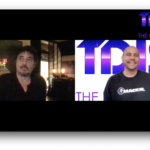Interview: Tom Paxton, Cathy Fink, and Marcy Marxer on new songbooks and ongoing activism

Keeping Burl Ives, Woody Guthrie and Pete Seeger’s inspiration alive.
Tom Paxton has helped to define what is generally understood to be meant by the term folksinger via a career that started in Greenwich Village with the folk revival. He was the first folk artist to not only research and keep older traditions alive, but actively added to that tradition with his own compositions. His songs have been recorded by countless other artists from various musical genres, he is a music educator, and he has maintained the link between folk music and social activism established by his early inspiration, Woody Guthrie. He has received numerous Grammy nominations and various awards recognising his achievements. Cathy Fink & Marcy Marxer are a Grammy award-winning folk duo, and individual recording artists, who have worked with Tom Paxton on and off over the last twenty years and share his views on the need for folk music to keep itself fresh and its power to support social change. Americana UK’s Martin Johnson caught up with Tom, Cathy, and Marcy over Zoom to discuss their latest collaboration, a double album of twenty-eight new songs written during the pandemic. It is fascinating to hear Tom Paxton’s personal recollections from the heyday of the folk revival, and how Cathy Fink and Marcy Marxer were inspired by the early days of the movement. While Tom Paxton, Cathy Fink, and Marcy Marxer have had long careers it is clear they are as committed to the folk tradition and social activism as they ever were.
Everyone is looking well, and I’ve got to say this Tom, you may not be the most famous songwriter from Greenwich Village, but you were probably the first to actually write your own songs.
Tom Paxton (TP): I am at least one songwriter from Greenwich Village, and there were none before me, haha.
You were a real pathfinder in that whole Greenwich Village Scene.
TP: I was just in Okemah, Oklahoma, a few weeks ago, which is Woody Guthrie’s birthplace and just twenty-six miles from my hometown. That was a thrill, to put it mildly, Okemah is such an unprepossessing place, there is not a lot going on there, haha, except for the Woody Guthrie Festival, but I saw a lot of friends there and it was great. I didn’t know Woody Guthrie existed until I graduated from high school and went down to the University of Oklahoma and started meeting other people interested in folk music, and I then started to hear his stuff. That is life-changing stuff to hear.
Before Woody Guthrie, there wasn’t the concept of the modern songwriter for people to follow and be inspired by.
TP: The songwriting that people thought about doing was popular songwriting, writing for the movies or Broadway, and writing for the hit parade, but Woody Guthrie opened up a whole new facility of songwriting. Songs that were about what was going on in the world and how to change it, and he was new, and he was a game-changer. It wasn’t until the 20th Century that anybody made a living singing traditional folk songs, and I think Burl Ives was the first one to do that. Before that, you were in the music business, or you were not.
Cathy Fink (CF): What about Theo Bikel, was he around at about the same time?
TP: Theo was later than Burl, Bikel’s career in folksong was in the mid to late ‘50s, and Burl, of course, started back in the late ‘30s and early ‘40s.
There are two parts to a folksong, the melody, and words. What did you concentrate on?
TP: I love the melodies of course, but the words were what set them apart from your average pop song on the radio. They were little stories, and I remember a song Burl Ives used to sing, ‘The Wee Cooper O’Fife’, you didn’t hear much “Knickety knackety no no no” on the radio back then, haha.
CF: I think I came to see it as storytelling, and I certainly learned a lot from Woody Guthrie, Tom’s storytelling, and Pete’s storytelling, and I find it to be a very flexible kind of storytelling. There are times when you can tell that story in a verse and a chorus, and then there are times when it takes a couple of pages. People don’t have the patience to listen these days to something that is super long, and I feel like our job as storytellers is to take that story and fit it into a melody.
So, it is the words, and you work the melody around them.
CF: Sometimes it goes the other way where Tom or I have the melody, there has been a riff going around our heads and it is like where are those words, haha?
TP: Sure, haha. Speaking of Pete, he is a postage stamp now, it is a new postage stamp that has just been issued, haha.
You wouldn’t have foreseen that in the ‘50s.
TP: No, you certainly wouldn’t, oh, definitely no.
CF: Who would have thought it? In his entire life, he would never have imagined he would be on a postage stamp.
TP: Right about the time my generation came along in around about 1960, the Communist Party was just a nonstarter, none of us cared a hoot about the Communist Party because it was irrelevant, whereas it had been important in folk music in the ‘40s, and for most of the ‘50s, but it was gone and people like Pete had left it long before. I had a couple of very interesting conversations with Pete about that, I used to say tell me about those days because it was ancient history to me, and I didn’t really care at all. Pete in one backstage conversation in Virginia said he and his friends had come to see that Stalin was if anything, worse than Hitler. Stalin certainly killed more people than Hitler did, and they all just kind of said chalk it up to innocence and walked away.
CF: And I think there was a whole sense at the time of them not fully understanding what was going on behind the scenes but wanting equality, and thinking this was a political road to equality, and when they found out that wasn’t the case they were gone. There was an idealism attached to it and we would attach that more to Socialism now than to Communism, and once it was clear the idealism, they were walking around with wasn’t the reality it was goodbye.
TP: In essence, it was about as democratic as a dinner party at Mar-a-Lago, haha.
CF: There’s a song we should write, ‘Dinner Party At Mar-a-Lago’, haha.
Pete Seeger is probably the most famous artist to link social politics with folk music nearly 70 years ago, do you think that initial burst of activity made any significant change, or are things currently as bad as they were all those years ago?
TP: I have a prize possession that is a paperback Burl Ives songbook which I’ve had for probably sixty-five years. I brought it with me when I came from Oklahoma to the Northeast, and in it, you will find some songs from our colonial period that are fairly devastating protests against your squad over there, haha, George III and that bunch, taxation without representation The Boston Tea Party. It just shows that part of folk music has been commentary from the working man and women about the powers that be and social injustice, all the way back. What was that wonderful couplet back in The Peasants Revolt in England with Wat Tyler, “When Adam delved and Eve span Who was then the gentleman”, and that is kind of unanswerable. You have to say score one for Wat Tyler. We have a long history in this music, and it isn’t just about “Knickety, Knackety, no no no”, it is about being badly led and being screwed by those in power. So, we would be fools, I think, to turn our backs on all that and say well, it is all happy happy.
CF: I think that the music serves so many purposes, and there are times when it just serves the purpose of charging the batteries of those people who are out there doing the social justice work. You will be at a benefit concert looking at the crowd, and you will go these people are already with us, so we need to reach those other people, but these people are working really hard just enjoying being together say we are in this together and that music charges us more. I don’t feel like it was over in the ‘60s or the ‘70s because some of the same songs are being rewritten and re-used to re-power movements. What is going on in the US at the moment is this great rekindling of the labour movement, and in places, we thought would never get unionised there is a crack opening, and that crack is getting bigger, and music helps power those cracks. Older music we bring forward, and newer music that people are making, and then there are the rest of our lives because it isn’t all about working on those causes because we have love stories, life and death stories that aren’t related to those causes. I feel that if you look back at Woody, look back at Pete, and others, there is much to incorporate and learn there. We are making art, it just so happens we are making art that is also going to empower people and activate them, but it is definitely going to connect people and that alone is worthwhile.
TP: Cathy can tell you when the pandemic began and all our dates disappeared, and we were prisoners in our own homes, Cathy and I decided to use Zoom to write some songs together and do it on a regular basis, 10:00 AM Wednesdays was our time.
It was not just some songs, you have twenty-eight on your new record ‘All New’.
TP: I’ve been writing with several partners, and I’ve written easily 200 songs during the pandemic, and Cathy and I have written at least fifty together.
CF: The ones on the new record are the ones we considered to be the best of what we wrote through December 2021, and we recorded those songs in January 2022. When we had finished with the recording and some of the production, Tom literally called me four days later and said we are writing today and I was like no, you need to give me some time to deal with the studio stuff, haha, let’s write next week. We got on the next week, and I was like I just don’t know if I have another song in me, haha. We had just rung ourselves dry, but what do you know, we wrote a terrific ukulele song called ‘A Little Ukulele Song’, and Marcy and I sang it at the Ukulele Fest we run in North Bethesda, Maryland. It was around the time that Ron DeSantis of Florida announced that you couldn’t say gay in schools, and in this place and that place, and immediately we got on Zoom with Tom and I said we need to write a song, ‘Don’t Say Gay’. We had so much fun, and then we went down to the Gay Men’s Chorus in Washington to one of their rehearsals, and again it was so funny, and the video is on YouTube, just spread it around. I feel there is a piece of us where there is a muse and sometimes those political songs are better when they are amusing. Yeah, we are as angry as hell, but if we can make people laugh at the same time and we can get the Gay Men’s Chorus of Washington with half of them wearing high heels and their red Gay Men’s Chorus of Washington red t-shirts and all that, and we got talking to some of them afterward and they said to Marcy they had recorded with her twenty years ago with The Names Quilt, and that they were so glad you are here with us. You find out that those connections can be so long-lived, it is really a beautiful thing.
TP: I was sitting next to a fellow whose name I think was Paul from Kansas, and he was wearing heels so high, and we just got on like a house on fire. I think that Cathy from time to time forgets the history of my time in the US Army, and I know how to crack the whip, haha. I know how to assemble the troops and get them digging. We had finished our frivolity of recording, and it was time to get back to the spade work. I remember a moment early in the project when it occurred to me, by and large with some exceptions, these are movement songs, we are writing songs for people who feel as we feel and who have marched and done their time supporting what we know is right. We were in Mexico on vacation, and of course, folksingers are never really on vacation, and we did a benefit concert down there that was just wonderful fun for us. We did an appearance at a Unitarian Church, and it was fun, those people feel like we do about so many things and it is for them we are writing these songs.
CF: We really started to think that our work together was writing a new community songbook, to include songs that everybody could sing, and that people could identify with. I’ve just sent a copy to my friend Dan Schatz, who is a Unitarian Universalist Minister and folksinger, and Dan is going to help get the songs out into the Unitarian world, like ‘The Freedom of Forgiving’ and ‘Grateful’ in honour of our friend Grace Griffith, it gave us an opportunity to think about people who either we have lost, or that are still here who we want to give thanks to. There are about six or seven songs on the project that are centred on this concept of community singing with great choruses for people to sing on and some of them are starting to have a little life of their own, and that is the idea.
TP: Exactly.
You said that you were strict and structured about the songwriting, which covers a lot of subjects and genres, but how did you decide and agree on the backing tracks?
TP: It is very, very democratic. When we signed on to sit down and write together it is always who has an idea and brings it to the table who is the boss of that song and makes all the decisions about that song and decides when it is done. That just works very well, I think. We started on a song this morning, and I think Cathy brought the idea.
CF: I did. Marcy and I are not just involved with folk music, we also do a lot of music for children and families, and we are connected to a lot of artists who are specifically creating songs for kids and families that involve the use of non-binary pronouns and the idea of trying to make everybody feel welcome. Marcy and I have done several projects similar to that in the past, and I feel we could use more songs to help that process along, and certainly, those of us who are a bit older have less experience with using the more contemporary pronouns for people who are non-binary, for transgender people. There is a whole new dictionary out there, and what I see is that a lot of young people are taking to it and it is like they learnt a new language, and they get it and it is hip and all is cool.
So, we were just writing a song about that to make it easier for people who aren’t used to that, and we are pretty close, but we aren’t quite there yet. I feel that part of it is our long friendship and our deep trust with each other and working on something either one of us will say a line and we will either move on or fight for it for a little bit, and then come back to it to see if we still need it. We rarely get stuck, and I want to bring Marcy into the conversation because while she hasn’t co-written these songs, she is often just a room away overhearing it all just go down, as is Tom’s daughter Kate who every now and again would shout, “Try this word”, haha. Also, Marcy is the big musical partner in the creation of the arrangements, the recording, a multi-instrumentalist, and usually, when the three of us get together Tom and I have the lyrics, the basic melody, and an idea on the basic instrumentation, and the sometimes happens when we are sitting right here, that is a banjo song or that is a this. Several times we said when we were doing this, let’s write some bluegrass songs specifically, and I would get a guitar and pull some bluegrass riffs. Then when it gets to Marcy, the arrangements become more defined and the style becomes more defined, and she is so versatile there is no limit to what she can do, it is just what is right for the song. From that point on she is an equal partner, she has the harmonies, she does all this incredible lead work, and she makes songs come alive.
Marcy Marxer (MM): Thank you, but it is such a treat to hear these two writing songs and being on the road with Tom we get a first-hand look at the process, and it is fascinating because there isn’t a tiny syllable that isn’t crucial, and Kathy is the same way. So, to hear them get together and just shout out I think we need an outlaw song, how about female outlaws, how about black female outlaws? You know, they will go anywhere and tackle anything, whatever is in the news, love songs, and it is a wonderful thing to hear that spark happening, and sometimes I just don’t say anything because it is such a joy just being a fly on the wall.
You still class yourself as a folksinger Tom, but a lot of your songs have escaped and moved to the mainstream, how does that make you feel?
TP: That is fun, I call that fun. There was a song of mine called ‘Wasn’t That a Party’ that was a rock song, but it was a funny rock song, and it became a huge hit in Canada. It is fun for me to be walking through an airport and hear your song on the jukebox, that is wow, it is a kick very often to folksingers. I have a new song about a woman from Kentucky singing in the underground, and I’ve called it ‘Underground Angel’. She sings about songs her mama knew that came from England, Scotland and Ireland that wound up in Kentucky, and I’ve never lost my love for that music. One of the things I do when I teach songwriting at Swannanoa is to get people to write new verses to old songs, which is just actually short-circuiting the folk process, and I always do it with them. My great addition to the catalogue this summer was for ‘Oh Susanna’, “I’ve caught the boat to Memphis for to see those Southern queens I had a sip of bourbon and I woke up in New Orleans Went to see the doctor and the doctor said to me It is time for us to be cutting off that banjo on your knee”. You do that kind of thing out of love for that tradition, and you try to add to it, as if you can but you can’t really but you can just put your little paddle in the water, haha. Of course, I’m aware of the other music forms, and country music would be the closest commercial music to what I do. I’ve just co-written a country song that is clearly in the country tradition, but it is all with a nod to the tradition of folk music.
CF: Well, there are a couple of good country songs on ‘All New’, ‘Perfect Strangers’ is a good one and it is like one of my favourite songs these days, and then there are a couple of love songs that really fit in as country songs.
TP: ‘I’m Still In Love With You’.
CF: The form we used for ‘I’m Still In Love With You’ is right at the crossroads of folk and country music.
Cathy and Marcy, you are the next generation folk artists, what drew you to folk music, and how have you developed your skills and knowledge?
CF: Well Marcy wasn’t born to folk music, but she was sort of born to a musical family.
MM: I was born into a family in Michigan which really liked everything, and we went to a black church with gospel music, Motown was on the radio, and my parents would take me to Civil Rights marches, and so I got more introduced to folk music through the Civil Rights Movement. As a kid, I was listening to records by Pete, Peter Paul and Mary, and other people that were coming up at that time. There was also some really sweet traditional music that was brought in because people came by from the Appalachian Mountains, people who were in the automobile factories in that area. I learnt about bluegrass and older types of music.
CF: And Marcy’s family played music, her grandmother played the hammer dulcimer, and she learnt a lot that way, and her mother kind of sang in a jazz trio, so the acorn didn’t drop far from the tree. She had a lot of encouragement on the music. As it turned out my mother was quite a good piano player, but she didn’t care whether she played or not, haha. My very first musical memories are me being about four years old daily insisting she accompanies me on songs as a belt them out next to her on the piano, and one of those favourite songs was ‘Little Brown Jug’ and the other was ‘Beautiful Dreamer’. I felt like a star when we were doing that together. In terms of folk music and traditional music, we had zero of that at home. I started playing guitar at twelve because my next door neighour best friend started and I wasn’t going to be outdone by her, haha, and she quit two months later, and I kept on playing. After about six months the lessons stopped, and it was many years later that I found out that the lessons stopped because we couldn’t really afford them as my father died when I was twelve.
The news was that the radio was amazing at that time, and as y’all recall, we didn’t have genre-specific radio, so when I listened to WCAO for two hours a day I heard The Supremes, The Temptations, The Weavers, maybe a Tom Paxton song, haha, Dylan, Roger Miller, I mean the world was your oyster, and literally, I started a little personal songbook in a little black notebook, and the very first song I wrote in it was ‘Wimbaway’ and when I eventually got to the end of high school somebody introduced me to Joni Mitchell, and that was life-changing with all these open tunings on guitar. I didn’t hear a banjo live and in person, even though the banjo was popular in downtown Baltimore a few miles from where I grew up, apart from The Beverly Hillbillies, until I moved to Montreal, and then I saw my first banjo, haha. After a while, you know what, it just started calling my name, and I play the banjo due to the influence of Joni Mitchell and Richard Farina when I took up Appalachian dulcimer which took me to Jean Richey, which led me to Paul Cayton, which led me down a very big rabbit hole. It was a beautiful rabbit hole of traditional music, mixed with contemporary music, and I took the leap down the rabbit hole without a safety net, haha.
‘All New’ is clearly a pandemic record, are there any plans to tour it?
CF: No, we are not really touring it because we have so many separate projects going on that we did a Zoom release party, and we have a concert on January 13th, 2023, a year after we made the album. As far as touring it, Marcy and I are doing quite a few of the songs in our shows, Tom is doing some of those songs in..



















Comments
This post currently has no comments.